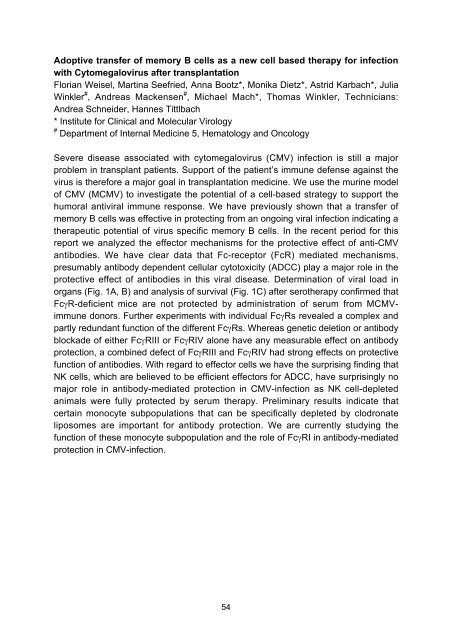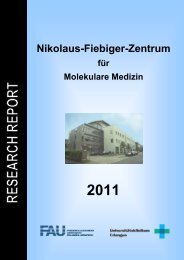Research Report - Nikolaus-Fiebiger-Zentrum für Molekulare Medizin
Research Report - Nikolaus-Fiebiger-Zentrum für Molekulare Medizin
Research Report - Nikolaus-Fiebiger-Zentrum für Molekulare Medizin
You also want an ePaper? Increase the reach of your titles
YUMPU automatically turns print PDFs into web optimized ePapers that Google loves.
Adoptive transfer of memory B cells as a new cell based therapy for infection<br />
with Cytomegalovirus after transplantation<br />
Florian Weisel, Martina Seefried, Anna Bootz*, Monika Dietz*, Astrid Karbach*, Julia<br />
Winkler # , Andreas Mackensen # , Michael Mach*, Thomas Winkler, Technicians:<br />
Andrea Schneider, Hannes Tittlbach<br />
* Institute for Clinical and Molecular Virology<br />
# Department of Internal Medicine 5, Hematology and Oncology<br />
Severe disease associated with cytomegalovirus (CMV) infection is still a major<br />
problem in transplant patients. Support of the patient’s immune defense against the<br />
virus is therefore a major goal in transplantation medicine. We use the murine model<br />
of CMV (MCMV) to investigate the potential of a cell-based strategy to support the<br />
humoral antiviral immune response. We have previously shown that a transfer of<br />
memory B cells was effective in protecting from an ongoing viral infection indicating a<br />
therapeutic potential of virus specific memory B cells. In the recent period for this<br />
report we analyzed the effector mechanisms for the protective effect of anti-CMV<br />
antibodies. We have clear data that Fc-receptor (FcR) mediated mechanisms,<br />
presumably antibody dependent cellular cytotoxicity (ADCC) play a major role in the<br />
protective effect of antibodies in this viral disease. Determination of viral load in<br />
organs (Fig. 1A, B) and analysis of survival (Fig. 1C) after serotherapy confirmed that<br />
FcγR-deficient mice are not protected by administration of serum from MCMVimmune<br />
donors. Further experiments with individual FcγRs revealed a complex and<br />
partly redundant function of the different FcγRs. Whereas genetic deletion or antibody<br />
blockade of either FcγRIII or FcγRIV alone have any measurable effect on antibody<br />
protection, a combined defect of FcγRIII and FcγRIV had strong effects on protective<br />
function of antibodies. With regard to effector cells we have the surprising finding that<br />
NK cells, which are believed to be efficient effectors for ADCC, have surprisingly no<br />
major role in antibody-mediated protection in CMV-infection as NK cell-depleted<br />
animals were fully protected by serum therapy. Preliminary results indicate that<br />
certain monocyte subpopulations that can be specifically depleted by clodronate<br />
liposomes are important for antibody protection. We are currently studying the<br />
function of these monocyte subpopulation and the role of FcγRI in antibody-mediated<br />
protection in CMV-infection.<br />
54



